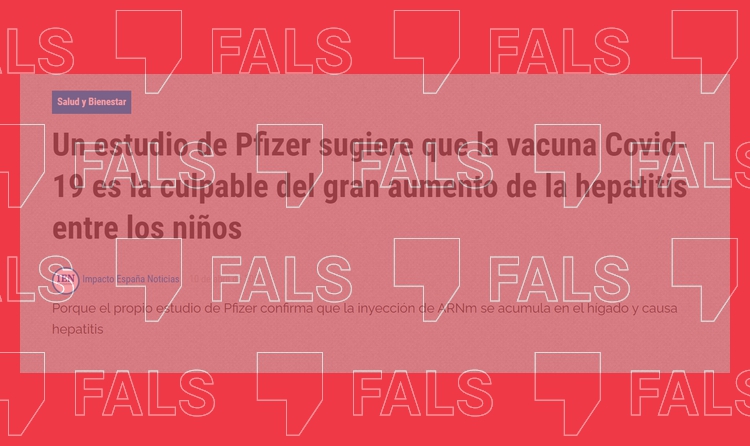No link between cases of hepatitis in children and the covid-19 vaccine

An article is circulating stating that the Pfizer vaccine causes hepatitis, but this is a false statement.

An article currently making the rounds on social media claims that a “study by Pfizer confirms that the mRNA vaccine accumulates in the liver and causes hepatitis”, and that this is the reason for the increase in severe hepatitis cases among children in various countries, including Spain (Spanish only). It is FALSE. Pfizer did not publish any report suggesting the above relationship and no similar study has been published in the scientific community.
A study by Pfizer suggests that the covid-19 vaccine is to blame for the huge increase in cases of hepatitis among children
In a dozen countries all over the world, Spain being one of them (Spanish only), an increase in cases of unusually severe hepatitis in healthy children are being reported. This condition, which consists of an inflammation of the liver, can have a multitude of origins, but there is no study by Pfizer confirming that “the mRNA vaccine accumulates in the liver and causes hepatitis”, as claimed in the misinformation messages on social media.
“No link has been found with the covid-19 vaccine”, declares the European Centre for Disease Prevention and Control (ECDC), the EU agency dedicated to monitoring and responding to infectious diseases, in an official statement on the matter. In fact, as the World Health Organization (WHO) points out, “the vast majority of children affected had not been vaccinated against covid”. For example, in none of cases (Spanish only) recorded in children under age 10 in the United Kingdom was the child vaccinated.
“The cases are concentrated in children under age 5, for whom there is no authorised covid-19 vaccination”, notes José Antonio Navarro-Alonso, who is a paediatric specialist, covid-19 vaccination expert and one of the founders of the Spanish Association of Vaccinology (Asociación Española de Vacunología, or AEV). “To date we do not have any evidence that the vaccines are responsible for a condition which by all indications is caused by the adenovirus F41”, he explains.
A poorly interpreted report from 2020
The text we are trying to verify cites a “biodistribution study of the Pfizer vaccine by the Japanese regulatory agency” as the source of its statements. It is referring to a study on mice from November 2020 which, in reality, was provided to the Japanese regulatory agency by the pharmaceutical company itself, and is cited on several occasions in the assessment report of the drug by the European Medicines Agency (EMA). The document does not state in any way that the vaccine causes hepatitis. In fact, EMA states the opposite: “There was no severe pathogenesis in the liver”.
On the other hand, it is true that case reports in humans have been published that raise the possibility that it was the mRNA vaccine – in the case of the above link, the Moderna vaccine – that led to certain types of hepatitis in adults. However, it does not mean that a cause and effect relationship has been established, but rather, simply, that the disease has been detected in certain people.
What is causing hepatitis in children?
The first tests have pointed to an adenovirus – specifically, type F41 – as the prime suspect, since it was found in the majority of the cases tested. In the United Kingdom, 40 of the 53 patients tested positive for the adenovirus, according to the British reports.
As Simon Taylor-Robinson, hepatologist at Imperial College of London, explains to SMC UK, “It is not uncommon to have adenoviruses in spring time”. But what has caught scientists’ attention is that this type, F41, is not generally associated with severe hepatitis cases in healthy children, as in the recently observed cases (although there is an association with it in immuno-compromised patients).
In their report from 25 April, the UK Health Security Agency raised the possibility that there could be a cofactor causing this “more severe clinical presentation in young children” with hepatitis, such as “increased susceptibility due to reduced exposure during the pandemic, prior SARS-CoV-2 or other infection, or a yet undiscovered coinfection or toxin”.